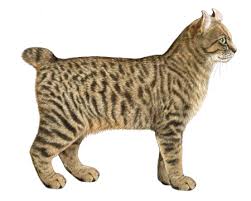
Highlander
Conditions of detention
Highlanders are active and thrive in environments where they have plenty of space to explore and play. They enjoy having access to climbing structures, interactive toys, and opportunities for exercise and mental stimulation.
Useful Fact:
Highlanders are known for their energetic and playful nature. They often enjoy interactive play with their human companions and are well-suited to families who can provide ample attention and engagement.
Nutrition and diet
Highlanders require a balanced diet rich in protein and essential nutrients to support their muscular build and active lifestyle. High-quality commercial cat food, either wet or dry, is recommended, and fresh water should always be available.
Useful Fact: Given their energetic nature, Highlanders may benefit from a diet formulated for active or athletic cats.
Health
Highlanders are generally healthy but can be prone to common feline issues such as dental problems and obesity if not properly managed. Regular veterinary check-ups are important for maintaining their overall health.
Useful Fact: Highlanders’ distinctive curled ears should be checked regularly for signs of infection or irritation.
Grooming and care
Highlanders have a short to medium coat that requires minimal grooming. Weekly brushing can help remove loose fur and reduce shedding. Regular nail trimming and ear cleaning are also important parts of their care routine.
Useful Fact: Despite their wild appearance, Highlanders’ coats are relatively easy to maintain and do not mat easily.
Education and training
These intelligent cats are highly trainable and respond well to positive reinforcement techniques. They can learn tricks, commands, and even how to walk on a leash with patience and consistency.
Useful Fact: Highlanders enjoy interactive training sessions that challenge their minds and provide physical exercise.
Toys and entertainment
Highlanders are active and playful, requiring a variety of toys to keep them engaged. Interactive toys, puzzle feeders, and climbing structures are ideal for this energetic breed.
Useful Fact: Regular play sessions help channel their energy and prevent boredom-related behaviors.
Safety
Ensure your home is cat-proofed to prevent accidents. Keep toxic plants, small objects, and dangerous substances out of reach. Secure windows and balconies to prevent falls.
Useful Fact: Highlanders enjoy exploring, so providing safe, enclosed outdoor spaces can enrich their environment.
Accessories
Essential accessories for a Highlander include a sturdy scratching post, comfortable cat bed, and interactive toys. Grooming tools like a brush and nail clippers are also important.
Useful Fact: A tall cat tree can satisfy their climbing instincts and provide a lookout spot.
Socialization
Highlanders are social cats that form strong bonds with their families. Early socialization helps them become well-adjusted and confident adults. They typically get along well with other pets and children.
Useful Fact: Highlanders can become anxious if left alone for long periods, so they thrive in homes where they receive plenty of attention.
Travel and Transportation
When traveling, use a secure and comfortable cat carrier. Acclimate your cat to the carrier well in advance of travel to reduce stress.
Useful Fact: Including familiar items like a favorite blanket or toy in the carrier can help ease travel anxiety.
Behavior and psychology
Highlanders are affectionate, playful, and enjoy being the center of attention. They may develop behavioral issues if they feel neglected or bored.
Useful Fact: Providing ample playtime and affection helps prevent destructive behaviors and keeps them happy.
Legal aspects
Ensure your Highlander is microchipped and registered according to local laws. This helps with identification if they ever get lost.
Useful Fact: Knowing the local regulations regarding pet ownership can prevent legal issues and ensure your pet is protected.


